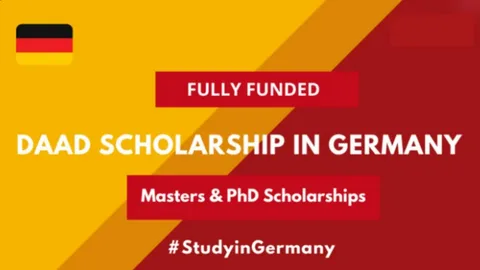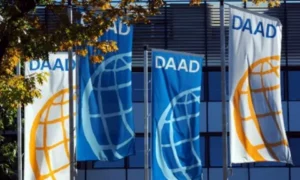The German Academic Exchange Service, commonly known as DAAD (Deutscher Akademischer Austauschdienst), has consistently been one of the world’s most prestigious funding organisations for international students. With a mission to promote international academic cooperation, DAAD offers a wide range of scholarships for students, graduates, doctoral candidates, and researchers. The DAAD Scholarship 2026 continues this tradition by offering fully funded opportunities to qualified applicants from developing countries to pursue postgraduate studies in Germany.
As Germany continues to stand out as a hub for academic excellence, DAAD scholarships serve as a gateway for scholars who aspire to receive world-class education, gain access to top-tier research facilities, and experience cultural exchange.
In this comprehensive guide, we will provide detailed information on the DAAD Scholarship 2026, including the programs offered, scholarship duration and scope, eligibility requirements, the application process, and professional tips to enhance your chances of success.
Programs Offered Under DAAD Scholarship 2026 DAAD supports a broad spectrum of postgraduate programs, particularly those relevant to development. These include, but are not limited to:
- Development-Related Postgraduate Courses (EPOS): These are master’s and PhD programs offered in fields such as:
- Economic Sciences/Business Administration/Political Economics, Development Cooperation, Engineering and Related Sciences, Mathematics, Regional and Urban Planning, Agricultural and Forest Sciences, Environmental Sciences, Medicine and Public Health, Social Sciences, Education and Law
- Postgraduate Studies for Professionals with Relevance to Developing Countries: These programs are tailored for individuals already working in development-related fields, whether in the public or private sector.
- Master’s and PhD in German Universities: DAAD partners with a variety of institutions that offer English-taught postgraduate programs specifically for international students.
Duration of Scholarship
- Master’s Programs: Generally 12 to 24 months, depending on the program and university.
- PhD Programs: Up to 42 months (3.5 years), depending on the research timeline and institution.
DAAD Scholarship Coverage
DAAD Scholarship 2026 for Masters and PhD Germany provides the recipient with the following benefits:
- Depending on academic level, monthly payments of 992 euros for graduates or 1,400 euros for doctoral candidates.
- Travel allowance, unless these expenses are covered by the home country or another source of funding
- Payments towards health, accident, and personal liability insurance cover.
- One-off study allowance.
Under certain circumstances, scholarship holders may receive the following additional benefits:
- Monthly rent subsidy
- Monthly allowance for accompanying members of the family
Eligibility Criteria for DAAD Scholarship 2026
To be eligible for DAAD Scholarship 2026 for Masters and PhD Germany, applicants must meet the following criteria:
- Required Languages: English or German.
- For international programs, the language of instruction is English. You are usually required to submit an English language certificate e.g. TOEFL or IELTS.
- For other programs, the language of instruction is German. You are usually required to submit a German language certificate e.g. DSH or TestDaF.
- Eligible Countries: Click here for a list of eligible developing countries.
- Candidates have a Bachelor’s degree (usually a four-year course) or Master’s degree in an appropriate subject.
- Candidates have at least two years of professional experience.
Demonstrate strong motivation to use the acquired knowledge for development-related work in your home country.
Application Process for the DAAD Scholarship
Note:
You can apply for up to three courses. If applying to more than one course, please list courses in order of priority in the DAAD application forms (see 7. Choice of host university/institution in Germany), and do not change the priorities in the application form.
- Research Eligible Courses: Visit the official DAAD website and go through the “EPOS” section to identify eligible courses.
- Check University Requirements: Each university may have specific application requirements (e.g., separate application portals, documents, deadlines).
- Prepare Documents:
- DAAD Application Form
- CV (in Europass format)
- Motivation Letter (with reference to current employment and chosen program)
- Academic Certificates (and translations if needed)
- Academic Transcripts
- Recommendation Letters (academic and professional)
- Proof of employment
- Proof of language proficiency
- Apply to the University and DAAD:
- In most cases, applications are submitted directly to the universities offering the courses, not to DAAD itself.
- Some universities require additional applications on their own platforms.
- Deadlines:
- Typically between August and October 2025 (for courses starting in 2026)
- Check individual course pages for specific deadlines
- Interview and Selection:
- Shortlisted candidates may be invited for interviews or further assessments.
- Notification and Visa Process:
- Successful candidates will be notified by DAAD and supported through the visa application and relocation process.

Required Documents for DAAD Scholarship
- Signed DAAD application form with current date
- Personally signed CV (please use the sample europass form at http://europass.cedefop.europa.eu/) with the current date
- Personally signed Letter of Motivation (concerning current occupation and choice of postgraduate program(s), two pages maximum) with the current date.
- IMPORTANT: When applying for more than one postgraduate course (maximum 3 courses), you have to submit one motivation letter explaining why you are applying for these specific courses and why you chose that priority.
- Letter of recommendation from your current employer; the letter must have letterhead, a signature, and an official stamp and must be of current date (not in a sealed envelope)
- Certificate(s) of Employment from the employer(s) that prove a minimum of two years of relevant working experience (after the bachelor’s degree) at the time of application and if possible, a guarantee of re-employment from your current employer upon returning home.
- Proof of Language Skills:
- English – IELTS or TOEFL (Note: The institutional TOEFL is not accepted)
- German – Required for courses taught in German
- Copies of Academic Degrees (certified translation if necessary)
- Copies of Academic Transcripts, including grading scale (certified translation if necessary)
- Applicants from the People’s Republic of China are asked to submit an APS Certificate with their application documents.
Why Study in Germany?
No Tuition Fees
One of the most appealing aspects of studying in Germany is that undergraduate education is tuition-free—even for international students. Public universities in Germany typically do not charge tuition fees, meaning you can pursue your degree without worrying about high academic costs. You’ll only need to cover a small administrative fee during registration, which is very affordable compared to most countries.
Even more exciting, after completing your undergraduate studies, you may be eligible to continue with a tuition-free postgraduate program. With no tuition fees, you’ll be able to allocate your budget toward accommodation, learning materials, exploring the country, and enjoying a rich student life.
Germany not only offers world-class education but also ensures that financial constraints don’t hold you back from achieving your academic dreams.
Job Opportunities After Graduation in Germany
Germany offers one of the most favourable post-study work policies in Europe for international graduates. After completing their studies, international students are allowed to stay in the country for up to 18 months to search for a job that aligns with their qualifications. This is a significantly longer period compared to other European countries, such as the United Kingdom, where graduates typically have only three months.
According to a 2020 report by the German Academic Exchange Service (DAAD), nearly 50% of international students choose to remain in Germany after graduation. This statistic highlights not only the welcoming environment but also the strong demand and opportunity for international talent in the German labor market.
German universities also maintain strong partnerships with leading companies and industries, offering students valuable access to internships, work placements, and job networks. This collaboration between academia and industry enhances employability and makes it easier for students to transition into the workforce.
In fact, the Times Higher Education Global Employability University Ranking consistently ranks German universities among the top in the world for graduate employability, reflecting their commitment to preparing students for successful careers.
Pro Tips
- Secure Strong Recommendations: Choose referees who know your work and can write persuasively about your potential and character.
- Proofread Thoroughly: German institutions value precision. Avoid grammatical and factual errors in your application.
- Start Early: Begin preparations at least 6 months in advance to avoid last-minute pressure.
Engage Alumni: Reach out to DAAD alumni via LinkedIn or local DAAD events. Their insights can be invaluable.
As Germany continues to stand out as a hub for academic excellence, DAAD scholarships serve as a gateway for scholars who aspire to receive world-class education, gain access to top-tier research facilities, and experience cultural exchange. For prospective applicants from Nigeria and other developing countries, the DAAD Scholarship 2026 presents a life-changing opportunity to advance their careers and contribute meaningfully to development back home.
Your journey to Germany, academic excellence, and impactful change begins with the first step: your application. You stand a real chance to join the ranks of distinguished DAAD scholars around the world. The time to act is now.
- Click To Read More

